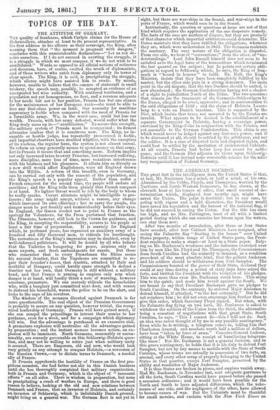TOPICS OF THE DAY.
THE ATTITUDE OF GERMANY.
that the Tuileries is hungering for peace, anxious only for more exports, and fresh embankments for canals. But those who remember that to every Frenchman the Rhine seems his natural frontier, that the Napoleons are committed to re- pair their founder's losses, that Austria, attacked by Italy and doubtful of Hungary, could hardly spare strength to defend a frontier not her own, that Germany is still without a military head, and that France is arming as empires only arm when danger is at hand, will hardly think a note of warning, however sonorous, premature. We can scarcely ridicule the householder who, with a burglary just committed next door, and with reason to distrust his household, warns the police to be on the alert, and looks to the caps of his revolver. The *isdom of the menaces directed against Denmark is far more questionable. The real object of the Prussian Government is probably to secure on any question, however trivial, the recog- nized leadership of Germany. Prussia will have gained much, if she can compel the princelings to intrust their armies to her guidance, even for a week, and for a campaign which diplomacy will win. But the advantage is purchased at an excessive risk. A premature explosion will neutralize all the advantages gained by preparation ; and the instant menace becomes action, an ex- plosion will be imminent. North Germans, reasonably or unrea- sonably, are scarcely governable on this Schleswig-Holstein ques- tion, and may not be willing to retire just when military unity is secured. There are Emperors, old and new, who would look very grimly on any attempt to conquer Holstein,—a reversion of the Russian Crown,—or to dictate terms to Denmark, a needed ally of France.
If Prussia apprehends the hostility of France on the first pro-
pitious occasion, she had better not stir in this Danish business until she has thoroughly completed that military organization, both in Prussia and Germany, which is the object of incessant efforts " on all sides. There is wisdom in preparation, but none in precipitating a crash of warfare in Europe, and there is good reason to believe, looking at the old and new relations between Denmark and France, that an invasion of Holstein, and certainly an invasion of Schleswig, which is indubitably Danish ground, might bring on a general war. The German fleet is not yet in
sight, but there are war-ships in the Sound, and war-ships in the ports of France, which would soon be in the Sound.
Intrinsically, the question or questions at issue are not of that kind which requires the application of the one desperate remedy. The facts of the case are matters of dispute, but they are precisely of that character which impartial arbitrators could determine. The Danes maintain that they have fulfilled the obligations, whatever they are, which were undertaken in 1852. The Germans maintain the contrary. The very nature of the obligation is disputed. From one side, we hear of "conventions;" from the other, of "un- derstandings." Lord John Russell himself does not seem to be satisfied as to the legal force of the transactions which terminated the last. quarrel on the subject ; but he points out certain obli- gations in regard to Schleswig which, he says, the King of Den- mark is " bound in honour ' to fulfil. Mr. Hall, the King's Minister, insists that they have been completely fulfilled by his master, but the other side puts in a strong demurrer. The main point in the old dispute, that the two Duchies should be united, is now abandoned ; the German Confederation having not a shadow of a right to jurisdiction North of the Eider. The two questions that remain are the treatment of the Germanic-Schleswigers by the Danes, alleged to be cruel, oppressive, and in contravention to the said obligations of 1852 ; and the claim of Holstein Lauen- berg to a veto on Danish taxation. This is supported by the Diet, which insists that taxes not assented to by the Estates are invalid. What appears to be desired is the establishment of a separate Government in Holstein, having a sovereign power, exercised by its King-Duke in conjunction with the Estates, and yet amenable to the German Confederation. This claim is one which would never be lodged against any first-rate power, and if to be discussed at all, should be settled by the arbitrator, and not the soldier. It is a case of disputed facts and disputed rights, and could best be settled by the mediation of uninterested Cabinets. At all events, Prussia had better keep her sword for nobler game, and the German Diet adjourn its views upon Schleswig- Holstein until it has devised some reasonable scheme for the mili- tary reorganization of Federal Germany.


























 Previous page
Previous page